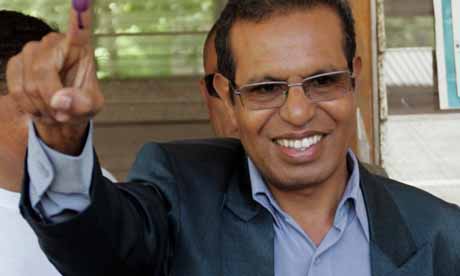Timor Lesté has a new president. He is former guerrilla and defence chief Taur Matan Ruak.
Ruak won 275,441 votes, or 61.23 per cent, while Francisco Guterres, known as “Lu Olo”, took 174,386, or 38.77 per cent, according to a count announced on Tuesday 17 April
Throughout his campaign Ruak reinforced his military image. Like Lu Olo, Ruak is a hero of the 24-year guerrilla war against Indonesian occupation.
He resigned as defence chief late last year to run for president, had vowed to introduce mandatory military service if elected.
Ruak, whose name means “piercing eyes” in the local Tetum language, was accused by the United Nations of involvement in illegal weapons transfers in 2006, when rioting and factional fighting left the nation on the brink of civil war.
In a speech published in January the incumbent President, and Nobel Peace Laureate José Manuel Ramos-Horta wrote,”I will run for office and it is up to the people to decide. But I will not engage in campaigning. The people know me – during the occupation I was the voice of the people, the shadow of the people in the world; I became Minister for Foreign Affairs for many years, during the 2006-2007 crisis I became Prime Minister and finally President, until now.
I will not campaign against other candidates because I am not better, nor smarter than my brother candidates.
During the coming weeks, I will only release a statement with my thoughts, my program for 2012-2017. I will continue to work at the Palace and visit various areas as I have always done in the past, but I will not engage in campaigning.
I can tell you today: should the people choose another candidate, I will support our new President in whatever way he may want and ask. He will not be alone.”
“As with most countries, Timor Leste is complex: in its history, in its various ethnic groups and languages and in its social composition and aspirations,”. says Good Samaritan Sister, Rita Mary Hayes who has been in Timor Leste since six months after the violence and destruction that followed the Timor Lesté people’s vote for independence from Indonesia on August 30, 1999.
“This year marks the tenth anniversary of independence gained from Indonesian occupation and is also the five hundredth anniversary of the arrival of Portuguese colonisers,” she says
“The people have experienced two different Presidents, two Prime Ministers and two different party-led Governments. These coming elections can now be based on choice based on their experience as well as their hopes. They are ready for it.”
On July 7, voters will choose a new government in a general election.
Sources
- Business Spectator
- The Good Samaritan Sisters – The Good Oil
- Office of the President of Timor Lesté
- Image: Praza
